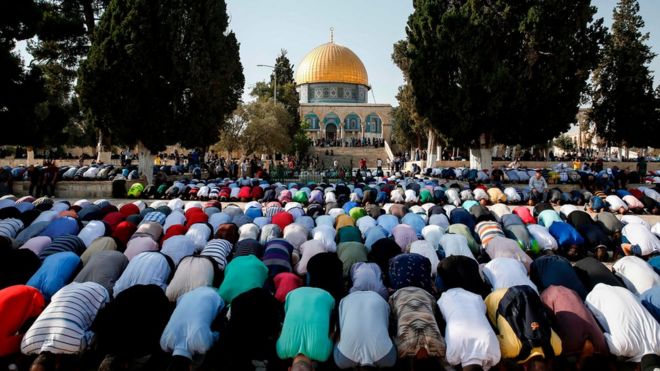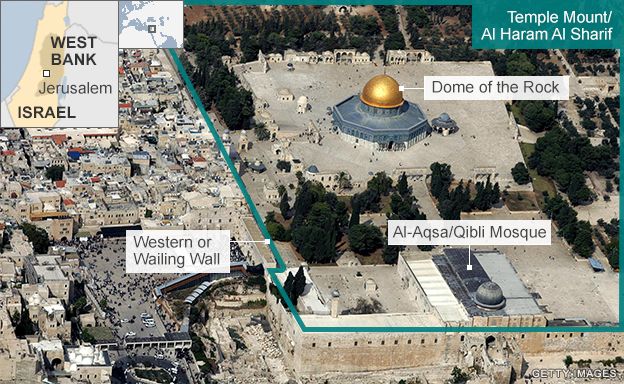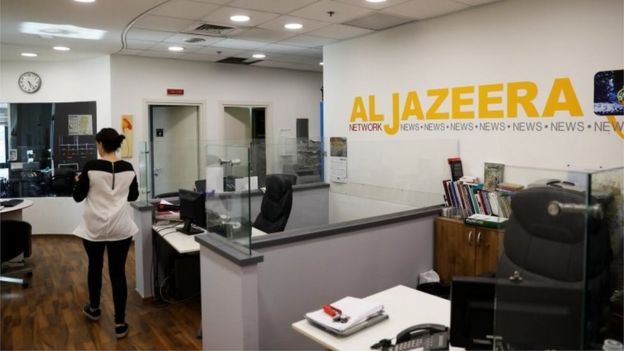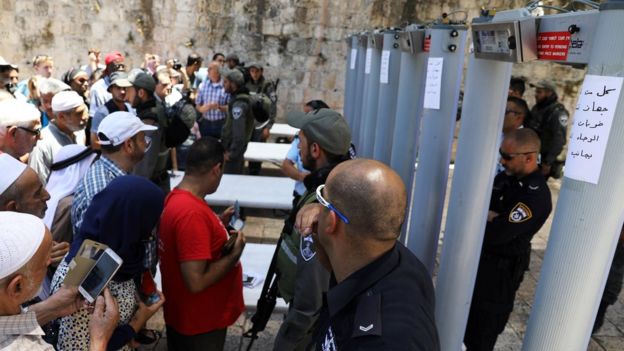
Palestinians have returned to a key holy site in Jerusalem for the first time in two weeks after Israel removed controversial security apparatus.
Worshippers flocked to the compound after Muslim leaders lifted a two-week boycott following Israel’s reversal.
The measures were introduced by Israel after the killing of two Israeli policemen nearby.
The last pieces were removed on Thursday after days of violence in which seven people were killed.
Palestinians had fiercely objected to the new security set-up, seeing it as an Israeli attempt to exert control over the Old City complex known to Muslims as Haram al-Sharif and to Jews as the Temple Mount.
Palestinian crowds were seen chanting and dancing in the alleyways outside, before entering for afternoon prayers.
There were also reports of some clashes on the narrow streets as police tried to control the surge by firing stun grenades and tear gas.
According to the Palestinian Red Crescent, dozens of people have been injured.

Last week Palestinian Authority President Mahmoud Abbas said he was freezing all contacts with Israel, including security co-operation, until Israel cancelled the new measures.
There have been intensive diplomatic efforts to resolve the crisis, involving the US and Jordan, which is custodian of the holy site and has a large Palestinian population.
The Israeli government has not yet commented on its decision to completely dismantle the infrastructure. Observers say it is a climbdown by Prime Minister Netanyahu, which will put him at odds with more right-wing members of his cabinet.
Education Minister Naftali Bennett, a political rival to Mr Netanyahu and whose party is part of the ruling coalition, criticised the decision.
“Israel comes out weakened from this crisis,” he told Israel’s Army Radio. “Instead of sending a message about Israel’s sovereignty on the Temple Mount, it sent a message that Israel’s sovereignty can be questioned.”
Analysis: Leaders on both sides under pressure
Tom Bateman, BBC Middle East correspondent
Aside from inflaming decades-old issues, this dispute has also been notable for the fierce criticism that leaders on either side have faced from some in their own constituencies.
As I watched Palestinian protests last Friday, people chanted not only against what they see as illegal occupation, but also against Mahmoud Abbas who they perceived as failing to represent them.
It may go some way to explain his tough stance earlier this week when his Fatah faction called for Palestinians to “intensify the popular struggle” despite Israel’s removal of the metal detectors.
Meanwhile, the Israeli prime minister has seen the right-wing of his coalition government excoriate the removal of the security measures as “weakening” Israel.
A poll this week suggested 77% of Israelis felt the government had “capitulated” in the face of Palestinian pressure, while a usually vehemently pro-Netanyahu newspaper branded the PM “helpless” and “feeble”.
This week’s crisis may hold some important lessons about how leaders will have to ride the waves of popular pressure when it comes to any new effort to solve the wider conflict.
The issue of control in East Jerusalem, occupied by Israel in the 1967 Middle East war, is one of the most contentious areas of dispute with the Palestinians.
Israel claims sovereignty over the whole of Jerusalem, though this is not recognised by the international community. Palestinians claim East Jerusalem as the capital of a sought-after state.
In a separate development, Mr Netanyahu accused the Qatar-funded, pan-Arab Al Jazeera TV channel of fuelling the crisis.
 Image copyrightREUTERS
Image copyrightREUTERS“The Al Jazeera network continues to stir violence around the Temple Mount,” he posted in Hebrew on his Facebook page, vowing to “enact the required legislation to expel Al Jazeera from Israel”.
Palestinians jubilant
Palestinians sang, danced and let off fireworks as railings and security camera gantries were removed from the Lions’ Gate entrance near the Temple Mount/Haram al-Sharif in the early hours of Thursday morning.
“For 12 days no-one has slept, no-one has done anything except the al-Aqsa mosque,” bystander Firas Abasi told AFP news agency.
He said he felt like crying over what he called a “victory”.
 Image copyrightREUTERS
Image copyrightREUTERSMass prayer gatherings had been held in the street outside the Old City walls and near-daily clashes between Israeli security forces and demonstrators have taken place since the metal detectors were introduced in the wake of the killings of the policemen near the site on 14 July.
Four Palestinians were killed and three Israeli civilians stabbed to death by a Palestinian who said he was avenging Israel actions at the site.
Israel said the security measures were necessary because the weapons used to kill the police had been smuggled on to the compound.
Earlier this week, it vowed to bolster its police presence around the site and introduce less obtrusive security measures over the next six months, including unspecified “advanced technologies”.
Source:-BBC


















